
Levi Stubbs was an American baritone singer, best known as the lead vocalist of the R&B group the Four Tops, who released a variety of Motown hit records during the 1960s and 1970s. He has been noted for his powerful, emotional, dramatic style of singing. In 1990, he was inducted into the Rock and Roll Hall of Fame as a member of the Four Tops.
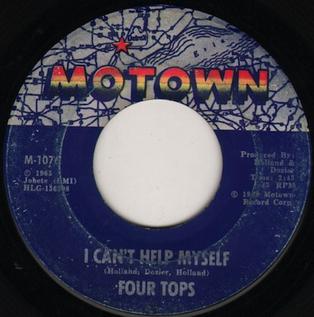
"I Can't Help Myself (Sugar Pie Honey Bunch)" is a 1965 hit song recorded by the Four Tops for the Motown label.
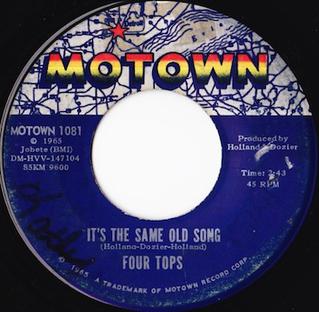
"It's the Same Old Song" was recorded by the Four Tops for the Motown label. It was released in 1965 as the second single from their second album. Written and produced by Motown's main production team Holland–Dozier–Holland, the song is today one of The Tops' signatures, and was reportedly created—from initial concept to commercial release—in 24 hours. It reached #5 on the Billboard Hot 100 and #2 on the Billboard R&B chart. It also reached #34 in the UK.
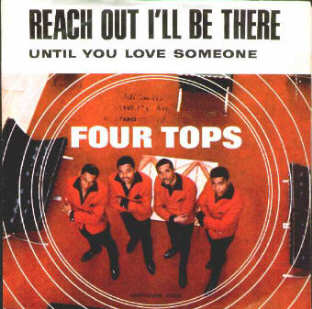
"Reach Out I'll Be There" (also formatted as "Reach Out (I'll Be There)") is a song recorded by the Four Tops from their fourth studio album Reach Out (1967). Written and produced by Motown's main production team, Holland–Dozier–Holland, the song is one of the most widely-known Motown hits of the 1960s and is today considered the Four Tops' signature song.
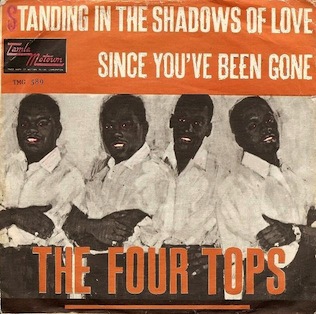
"Standing in the Shadows of Love" is a 1966 hit single recorded by the Four Tops for the Motown label. Written and produced by Motown's main production team Holland–Dozier–Holland, the song is one of the most well-known Motown tunes of the 1960s. A direct follow-up to the #1 hit "Reach Out I'll Be There", "Standing in the Shadows of Love" reached #2 on the soul chart and #6 on the Billboard Hot 100 in 1967. It also reached #6 in the UK. Though the song was well-received, it has received some criticism. Author Martin Charles Strong notes that it rehashed the formula of "Reach Out I'll Be There" and achieved similar success by reaching the Top 10 in both the US and UK. It is ranked #470 on Rolling Stone's list of The 500 Greatest Songs of All Time in 2010 and #464 in 2004.

"Bernadette" is a 1967 hit song recorded by the Four Tops for the Motown label. The song was written and composed by Holland–Dozier–Holland, Motown's main songwriting team, and produced by Brian Holland and Lamont Dozier.

"7 Rooms of Gloom" is a song recorded by the Motown Records vocal quartet the Four Tops. It was released as a single in 1967 on the Motown label and reached #14 on the Billboard Hot 100, and was a Top 10 R&B Hit, charting at #10. It was also a hit in the UK, their seventh, staying for nine weeks in the UK Singles Charts and reaching #12 and in the Netherlands where it made #23 in the Dutch Top 40.
"If I Were a Carpenter" is a folk song written by Tim Hardin in the 1960s, and re-recorded with commercial success by various artists including Bobby Darin, The Four Tops and Johnny Cash. Hardin's own recording of the piece appeared on his 1967 album Tim Hardin 2. It was one of two songs from that release performed by Hardin at Woodstock in 1969. The song, believed by some to be about male romantic insecurity, is rumored to have been inspired by his love for actress Susan Morss, as well as the construction of Hardin's recording studio.

"Ain't No Woman (Like the One I've Got)" is a song written by Dennis Lambert and Brian Potter, released as a single by the Four Tops on the ABC/Dunhill record label, from the album Keeper of the Castle. It peaked at number four on the U.S. Billboard Hot 100 the weeks of April 7 and 14, 1973, number one on the Cash Box Top 100 the latter of those two weeks, and became a gold record.

"Loving You Is Sweeter Than Ever" is a 1966 song written by Ivy Jo Hunter and Stevie Wonder. It was performed by the Four Tops via the Motown label. In addition to co-writing the song, Wonder also instrumentally contributed drums to the track.

"When the Lovelight Starts Shining Through His Eyes" is a song written by Holland–Dozier–Holland and recorded in 1963 by Motown singing group The Supremes. It is notable as the Supremes' first Billboard Hot 100 Top 40 recording, following seven previous singles between January 1961 and September 1963 which failed to enter the Top 40. The single is also notable as the first Supremes single written and produced by Holland–Dozier–Holland, who had previously created hits for Martha and the Vandellas and Mary Wells.
"First I Look At the Purse" (G7044) is a 1965 song recorded by R&B group the Contours on Motown Records' Gordy label. It was written by Miracles members Smokey Robinson and Bobby Rogers, the authors of the Temptations' first hit single, "The Way You Do the Things You Do".
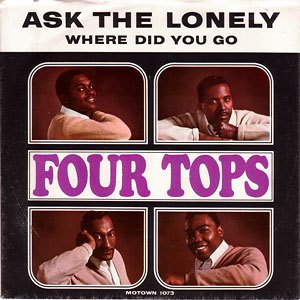
"Ask the Lonely" is a soul/pop ballad recorded by Motown singing group the Four Tops. Released as the group's third single, the single became the group's second successful single since signing with Motown in 1963. Released in 1965, the song rose to no. 24 on the pop chart and no. 9 on the R&B one. It is notable for being co-written by longtime Motown staffer Mickey Stevenson, as most of the group's hits on Motown were written and produced by Holland-Dozier-Holland. Levi Stubbs sang the lead, with The Andantes joining the other Tops on the background vocals. The music was performed by The Funk Brothers and the Detroit Symphony Orchestra provided the instrumentation.

The Four Tops are an American vocal quartet from Detroit who helped to define the city's Motown sound of the 1960s. The group's repertoire has included soul music, R&B, disco, adult contemporary, doo-wop, jazz, and show tunes.

Four Tops Second Album is a 1965 R&B studio album by vocal quartet the Four Tops. The album, released on the Motown record label, reached No. 3 on Billboard's Black Albums chart and No. 20 on the Billboard Top LPs chart. The album contains three hit singles. "I Can't Help Myself " reached No. 1 on both the Black Singles and Pop Singles charts, while "It's the Same Old Song" reached No. 2 and No. 5 respectively, and "Something About You" reached No. 9 and No. 19. In 1990, Motown bundled the Four Tops' first two albums together in a release titled Four Tops/Four Tops Second Album.

“You Gotta Have Love in Your Heart” is a duet single between Motown singing groups The Supremes and the Four Tops, released as a single from their The Return of the Magnificent 7 album in 1971. The single became a modest charter peaking at #55 on the U.S. Billboard Hot 100 chart and #41 on the U.S. Billboard R&B Singles Chart. The single fared better in the UK, where it reached #25 in the official top 50 single chart. Lead vocals were by the groups' respective lead singers Jean Terrell and Levi Stubbs.
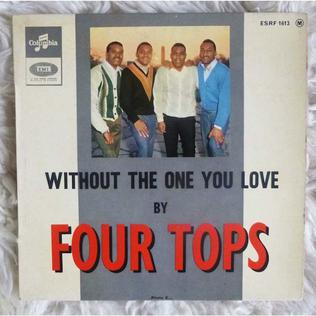
"Without the One You Love (Life's Not Worth While)" is a song written by Holland–Dozier–Holland and released as a single in 1964 by the Motown singing group The Four Tops as the second single from their self-titled debut album, Four Tops. The group would later cover the song with The Supremes.
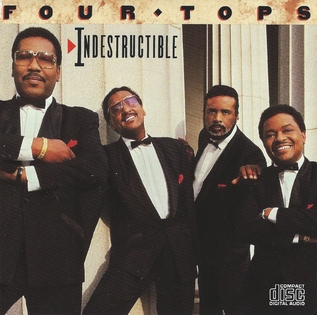
Indestructible is a studio album by American soul music vocal group Four Tops. The album was released on August 25, 1988, their sole release on Arista Records.

Magic is an album recorded by the Four Tops, released in 1985 on Motown Records. The album reached No. 23 on the Blues & Soul Top British Soul Albums chart and No. 33 on the Billboard Top US R&B Albums chart.
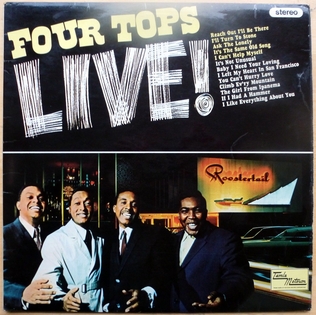
Four Tops Live! is the first live album by American rhythm and blues vocal band The Four Tops, released on Motown in 1966. The album was recorded as part of a series of concerts by the record label featuring their premier artists held in Detroit and had positive critical and commercial reception.


















